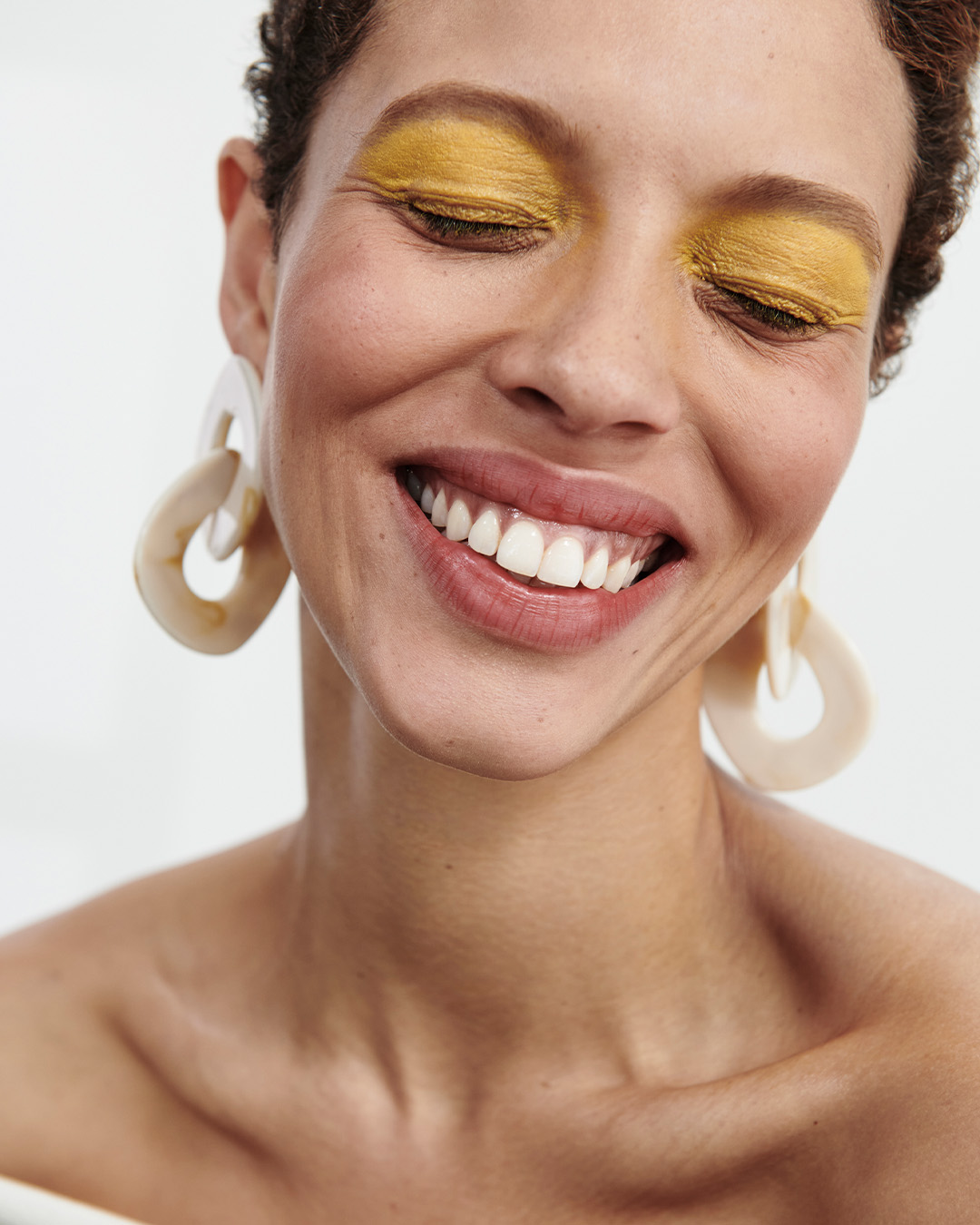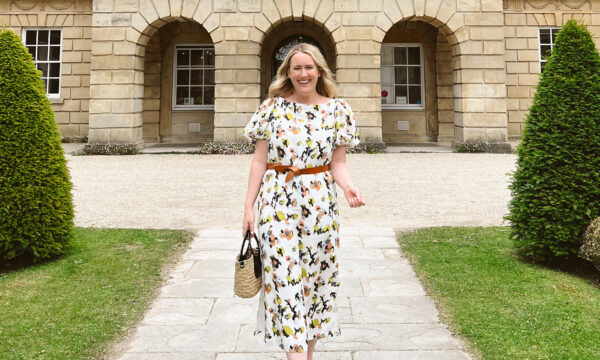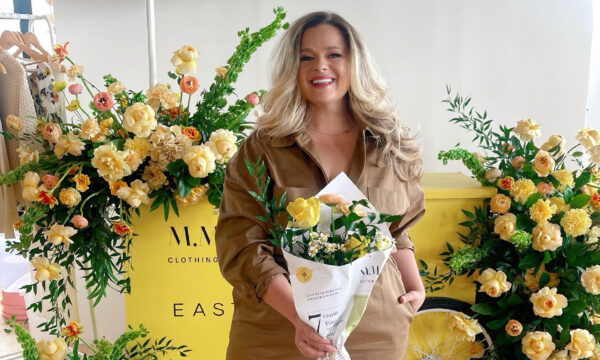
The Freedlund caftan.
Makeup Has Officially Returned to the Office
Foundation, eyeliner, and mascara have even more meaning now.
Want more M Dash?
Sign up for our weekly newsletter.
Thank you!
After two-plus years beneath Zoom filters and protective masks alike, faces are finally back. And as people return to the office—either full-time, on hybrid schedules, or for the occasional meeting—we’re turning back to makeup to look polished and work-ready. But makeup no longer means the same thing to those wearing it. For some, it’s a welcome return to normalcy; for others, it still feels like a chore.
That said, makeup is kind of a big deal; it’s more than just something to experiment with every morning. “The way that we groom ourselves and put ourselves together affects the way we feel and how we interact with others—and our own self-image,” says Chloe Carmichael, Ph.D., clinical psychologist and author of Nervous Energy: Harness the Power of Your Anxiety
And without society—and social interaction—during the pandemic, there wasn’t much of a need for makeup. The proof is in the numbers: Research from McKinsey found that sales of lipstick and face makeup dropped between 2019 and 2020, while eye makeup inched up only slightly (possibly because it was the only thing anyone could see above a mask). That tracks for Nkechi Iloka, who works in human resources and blogs about natural hair in the corporate space on the side. “Once we transitioned into quarantine, I never touched my makeup—not even for presentations or meetings,” she says. That said, it wasn’t a huge shift from her usual look, which was minimal at most.

Carmichael saw it among her clients, too. “With Zoom, you can click ‘Touch up my appearance’ and have that more polished look without actually putting on more makeup,” she says. “So I think the pandemic caused those routines to become much more relaxed, to the point where some women let their hygiene go—without realizing that hygiene and self-grooming are big parts of mental health.”
Others, however, used makeup as a touchpoint during the pandemic. “Putting on my makeup daily became a small way I maintained my humanity and personality,” says Amanda Beard, an attorney for the state of Washington. “It became something that I did for my enjoyment and not just because I wanted to look presentable in society. I started doing my hair and makeup and dressing up daily as a way to stay engaged and treat myself.”
And now that women are heading back to the office, the general attitude toward makeup is shifting yet again. That’s important, since it’s basically the visual equivalent of announcing that you’re ready to be a part of the group. “What research actually shows is that in the professional space, women who wear light makeup tend to be the most successful. That’s generally because when we wear even light makeup, we’re showing some behavioral interest in grooming ourselves,” says Carmichael. “What that does is project interest in our tribe and how people perceive us, which is a form of social openness and interest in others.”

The Edith dress and Capri earrings.
Beyond the social aspect, it also just feels nice to do something for yourself after going directly from shower to couch for so long. “I realized that life and time are so precious—so if I have an opportunity to do something, even if it’s something as small as applying makeup to make me feel and look good, why not do it?” says Iloka, who returned to office in March of 2021. “Being able to wear makeup and establishing a light makeup routine for work actually has been something that I’ve been excited to do since I’ve been back in the office.” She still has a light hand—think tinted moisturizer, bronzer, and lip gloss—but it’s more than what she used to wear.
For Beard, who returned to work this past April, the pandemic was even more impactful on her beauty routine; not only did she continue with her hair and makeup regimen, but she actually experimented with colors and textures that would pop on-screen. That enthusiasm shows no sign of flagging now that she’s returned to her office. “Instead of my makeup being something I have to do, it is something I get to do for myself,” says Beard, who now swears by a bold lip color. “The pandemic taught me to stop wishing about the woman I wanted to be and just start being her. I now show up as the woman I am and want to be daily—no more wishing, only doing.”
Taylor Evans, a Ph.D. candidate in molecular neurogenetics at Johns Hopkins School of Medicine, has had a slightly different approach. Rather than maximizing her makeup, she’s gone all in on her skin-care routine, which she had never done before, either. “As a whole, I’ve never been makeup-centric,” she says. “I’ve always been bare minimum—some days that might be mascara, maybe it’s lipstick.” Plus, her career doesn’t exactly lend itself to makeup, she says, as professional appearance isn’t typically prioritized in the research field.

The Camilla top and Etel earrings.
“I’m way more conscious now of washing my face and putting on moisturizer and vitamin C serum—that’s my routine now,” says Evans, who splits her working time between a lab and an office. “My skincare routine makes me feel refreshed and polished without having to do a full face of makeup—especially if I’m wearing a mask anyway.” (She’s not alone: A study in the Journal of Cosmetic Dermatology found that interest in skin-care routines rose over the course of the pandemic.)
Whether through skin-care or makeup, a routine can be helpful for our collective mental health as we transition back into some semblance of normalcy, Carmichael says. “It’s good for our own sense of self, so I think that returning to work and being in a real-time community with others is a good thing,” she says. “It’s generally good for people’s self-confidence when we have more realistic comparisons and perceptions of each other.”
In our third year of Covid, there doesn’t seem to be much value in holding back anymore. “One of my takeaways from the pandemic experience is that there is no time but now,” Beard says. “I am a bright and colorful person on the inside. I have always wanted my outside to reflect that.” With makeup, she can ensure just that.

The Leo pullover.










